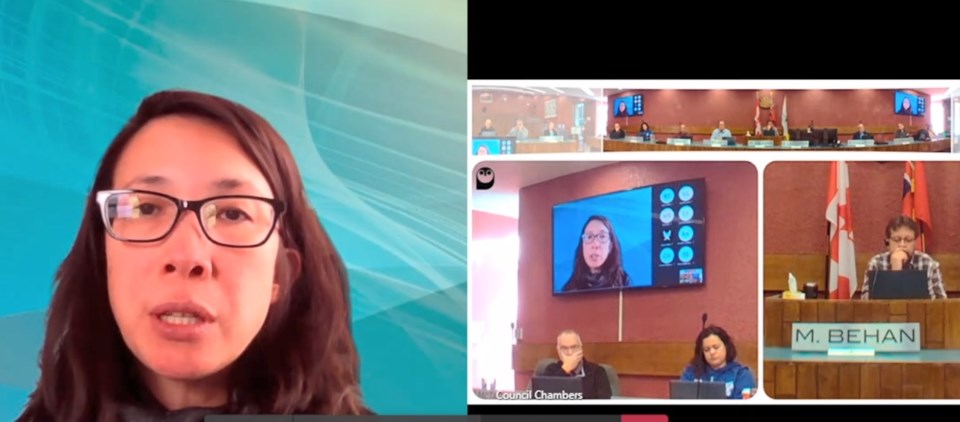FORT FRANCES — Fort Frances had the highest rate of opioid overdose emergency room visits in the Northwestern Health Unit area from 2017 to 2021.
That was one statistic cited by Northwestern Health Unit medical officer of health Dr. Kit Young Hoon during a presentation to Fort Frances council on Monday.
At the meeting, Young Hoon gave a deputation on specific findings for Fort Frances from the 2022 opioid report and discuss further the health unit report on supervised consumption services.
She said Fort Frances had the highest rates of emergency room visits for opioid overdose, with 47 visits in 2021 representing an increase of 370 per cent over that period.
“So the increase in opioid overdoses, deaths and emergency room visits, we've definitely seen clearly from 2018 to 2021 and into 2022 statistics. Mortality has also increased for opioid overdose,” she said.
Young Hoon also detailed some recommendations specifically for Fort Frances from the recently released report on supervised consumption services.
“So to me, the first recommendation is most meaningful. It's that the rates of substance use harms in Fort Frances are significant enough to indicate a need for a greater harm reduction in treatment services. The addition of supervised consumption services are recommended as a means to reduce the risk of harm of overdose and overdose deaths among people who use drugs,” she said adding the remaining recommendations outline an approach to how a community could go about implementing that overarching recommendation.
Young Hoon emphasized harm reduction was just a small part of the overall strategy to address addictions and substance use. The other pillars are prevention, treatment and enforcement.
“Harm reduction sits between prevention and treatment. It is useful when prevention is failed and when treatment is not readily available,” she said.
After her presentation, councillors asked questions, with one focused on how to educate the public on these issues.
Young Hoon said since there are many different types of stakeholders and individuals, there is a need to explain clearly the evidence around supervised consumption services.
“We will be amplifying that type of messaging. I think we could do things such as host a broader webinar just to look at the evidence base around supervised consumption services that anyone could attend,” she said. “We can do video recordings that are posted on our website to go more into the evidence base for those individuals who might want more detailed information.”
She said it was important to provide council with appropriate briefing notes and papers and encourage them to learn more about them, which might help answer questions about supervised consumption services from residents.
“One of the things that came out in the report and some questions that tend to come up is what will the impact be on criminal activity,” she said. “Right now, there is evidence that a number of published papers and a number of reviewed documents that have looked closely at that question and have noted that with the implementation of supervised consumption services, the evidence generally does not show an impact on criminal activity.”
Young Hoon told council the health unit is expected to use data to help inform community partners on appropriate local public health policy and programming and services, specifically for substance use, substance misuse and reducing harms and other harm reduction program under our substance use and injury prevention standard.
She was asked how council could take the first step towards getting supervised consumption services in or around Fort Frances.
“You can of course express your position on the services. If you wanted, to pass some type of resolutions for explaining your support for supervised consumption services and a larger harm reduction strategy in Fort Frances, I think that would be useful,” she said. “When we start thinking about a location, it would be very important to engage municipal staff because there might be things such as [zoning] to make sure it's meeting municipal bylaws on planning. Having staff engage with that type of work with us would be helpful.”
She was asked about the next steps in the process.
“We're taking it to appropriate tables. For Fort Frances, one of the key tables would be the Ontario Health Team, mental health and addiction subcommittee, but that committee doesn't have necessarily all the stakeholders," she said. "I's also necessary to continue to engage the municipality, some of the staff at the municipality as well as to engage enforcement, [the Ontario Provincial Police] in particular into the conversation.”
Yong Hoon said it’s often useful to have a clear lead for a program, which could be an agency already provides service and has an existing relationship with the population.
“The other key thing of course is funding, there is no existing funding for this,” she said. “It would be necessary to apply for funding.”
